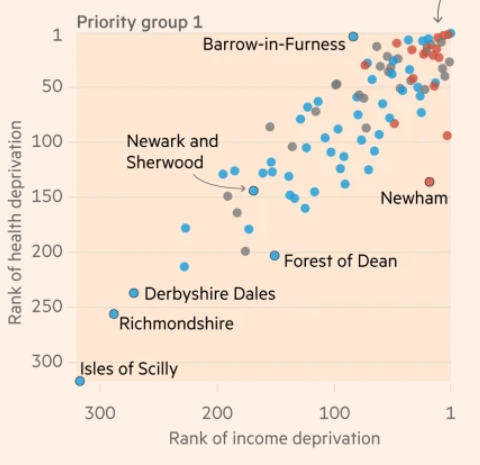We have had a small taste this week of what ‘levelling up’ means to Boris Johnson. Not investment in jobs and infrastructure in the most deprived parts of the country, but another Tory scam to direct money to their own supporters and voters.
The awful years of the Thatcher government saw large parts of British industry destroyed: shipbuilding, steel, mining, heavy engineering. Those years created dead towns and cities, particularly, but not exclusively, in the north of England, in Scotland and in South Wales.
Those pockets of high unemployment and economic deprivation were offered no respite or investment to speak of during all the years of New Labour governments and have been just as neglected since, through the austerity years of the post-2010 Tory governments. It is hardly surprising that so many voters in these towns and cities felt ‘left behind’, neglected by London, ignored by the EU, and forgotten by the main political parties.
A clever but cynical political ploy
It was a clever and cynical political ploy for Boris Johnson, in the 2019 general election campaign, to promise to ‘level up’ these parts of the UK. With his economically illiterate but catchy slogan of ‘Get Brexit Done’, he managed to break through the so-called ‘red wall’ seats in the north and win constituencies that had been voting Labour for decades.
The question that these voters ought now to be asking is ‘when will the levelling up begin?’. The Tories have given their answer this week – not yet! And get in line behind Tory constituencies!
An analysis by the Financial Times (of all papers) on March 5, showed how the new £4.8bn so-called ‘Levelling-up Fund’ favours Tory-voting areas that don’t need the investment half so desperately. Even Keir Starmer, offering a lamentable opposition at the best of times, was right for once, referring to it as “pork barrel politics.”
Levelling up? Richmond higher priority than Barnsley
The Financial Times found that eleven areas in England represented solely by Tory MPs – areas in the lower half of national deprivation rankings – have been put into the Levelling-up Fund’s highest category. These, including Rishi Sunak’s leafy Richmond constituency in rural North Yorkshire, have been classified as “priority one” regions, while some of the most deprived areas of the country have been classified as “priority two”.

As well as rural Richmond, other “priority one” areas include the Derbyshire Dales, the Forest of Dean and Newark and Sherwood, the latter represented by Communities’ Secretary (and great friend of property developers) Robert Jenrick. And the department that drew up the rankings and awards the monies?…Robert Jenrick’s, of course.
Tory areas consistently given a higher priority
In contrast to these relatively well-off areas, Salford, which ranks 12th in the country for health needs and 32nd on income, is in “priority two”, along with Barnsley and Bolsover. Of the 93 local authority areas in priority one, the Financial Times found, 51 have Tory MPs, 16 Labour and 26 have both.

The Financial Times analysis shows that all fourteen local authorities in England considered more prosperous than the national average that were placed in “priority one” had at least one Tory MP, while only three had a Labour MP as well. Their analysis found that “Conservative areas were consistently placed in a higher priority category than their deprivation level and many Labour voting areas in a lower one.”
The prioritisation is significant, because it means that if these areas bid for new infrastructural investment and state aid – the Fund focuses on town centres and high street regeneration, local transport and cultural/heritage assets – they are “more likely to succeed.”
More pork barrels than you can shake a stick at
Diane Coyle, Professor of Public Policy at Cambridge University, is quoted in the Financial Times as saying that the bias “is pretty blatant really…I am sure there are civil servants trying to retrofit the methodology to justify the rankings as we speak.”
Not coincidentally, it was also revealed last week that another government pork barrel, the Community Renewal Fund, also prioritised seven cabinet members’ seats, including those of Sunak and Jenrick.
Then again, last November, an inquiry by the National Audit Office into similar criticisms of the distribution of the £3.6bn Towns Fund in 2019, came to similar conclusions. In its report, the NAO questioned whether decisions on priorities weren’t politically motivated, saying it was “not convinced by the rationale for selecting some towns and not others”, with ministers’ reasoning “vague and based on sweeping assumptions.”
This latest government bias in so-called ‘levelling-up’ is so bad, in fact, that the Financial Times even deemed it necessary to publish an editorial on the issue on March 7.
“In his first speech as prime minister,” it says, “Boris Johnson pledged to answer “the plea of the forgotten people and the left-behind towns”. Few would have guessed that, just two years later, they would count among their number the affluent market town of Richmond in the North Yorkshire countryside but not deprived Barnsley in the former South Yorkshire coalfields.”
Tory cronyism and corruption should be called out
There is no answer suggested by the FT, apart from calling on the government to publish the rationale behind its choice of priorities – something it has steadfastly refused to do.

As we have noted on many other occasions, the crimes of Tory cronyism and legalised corruption are compounded by the political crime of the absence of a serious opposition. What Steve Reed, Labour’s shadow communities and local government secretary, said was that financial regeneration funds should reach all communities “as a matter of course,” but he offered no answers as to how that could be done. More to the point, he might bleat politely about “transparency”, but Labour’s spokespersons don’t use their parliamentary privilege – as they ought to do – to call out this corruption for what it is.
Labour needs to break with the past
As long as it bases its policies on the status quo, ie on the limitations of capitalism, then the right wing of the Labour Party, like the Tories, will fail the most deprived areas of the country, as they did – as MPs and as Labour councils – for years. Labour needs to break completely with the policies of the past, as it started to do under Jeremy Corbyn. It needs policies based on “a fundamental and irreversible shift in the balance of power and wealth towards local people”, to coin a phrase used by Labour leaders between 2015 and 2019.
As long as politics, investment and government spending are based on enriching a tiny handful of the population, ‘levelling-up’ is a sick joke. Socialist policies and planning at a national level, based on the common ownership and democratic control of the big banks and major companies, would allow for massive investment in new green industries, in infrastructure and in jobs in all areas of the country, beginning with the most deprived towns and cities. True levelling-up begins with socialist investment, spending and priorities for the many, not the few.



